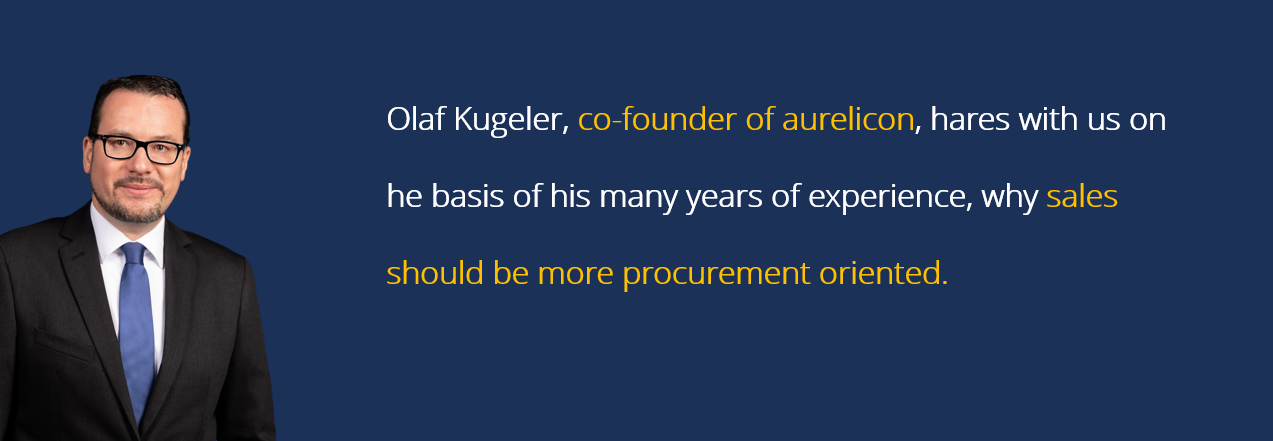Existing customer? Login
Interview
August 9th, 2023
Procurement-Oriented Sales - Interview with Olaf Kugeler from Aurelicon
 Rubina Hatziparassidis
Rubina Hatziparassidis
Today, we have the pleasure of speaking with Olaf Kugeler, co-founder of "Aurelicon," about a new approach in sales called "Procurement-Oriented Sales"!
Let's start right from the beginning. Mr. Kugeler, how did you get into the procurement department, and how did you transfer your procurement experience into sales?
After completing my business studies and gaining several years of experience in marketing & procurement, I led the transformation of the procurement function in an international pharmaceutical company into a modern, strategic department. We progressively included additional categories such as consulting services, IT, and marketing in procurement and achieved significant cost savings. These experiences led me to develop a sustainable sales strategy. After an intense period in procurement, I transitioned into the consulting industry and decided it was time to start something of my own.
Together with my long-time companion and friend, Peter Szczensny, I recognized the need for sales to deeply understand what drives procurement in its activities and how sales could comprehend and implement this knowledge to collaborate more constructively with procurement in the future.
This marked the birth of our solution "Procurement-Oriented Sales" (POS). After further discussions with executives from agencies and consulting firms, it became clear that we had struck a chord and could address a longstanding need that had always been there but had never been met due to the lack of pioneers and procurement expertise. From then on, we saw our mission as bringing sales closer to procurement and building a constructive bridge between the two professions, which had been connected mostly by mutual misunderstanding, prejudices, and pure antagonism.

Peter Szcensny and Olaf Kugeler
What role do supplier relationships play in procurement-oriented sales, and how do you build these relationships?
One of the mistakes made by salespeople is that they often view procurement as an adversary and therefore try to involve them as late as possible in the sales process. However, this backfires later in the process when procurement becomes aware of it, leading to resistance against the supplier rather than the willingness to find a good solution for the company together with the salesperson.
Various surveys and analyses also clearly show that bypassing procurement by sales (and also bypassing their own procurement by departments!) is the biggest annoyance for procurement, leading them to be antagonistic towards both external service providers and internal departments engaging in such "Maverick Buying."
With our approach of procurement-oriented sales, we help to resolve this destructive situation.
We encourage salespeople to engage with procurement very early on, understanding how the procurement processes work. By the time a specific request or tender comes in, a relationship already exists not only between the department and the salesperson but also between procurement and the salesperson. We encourage collaboration, moving away from the traditional adversarial relationship.
Would you like to learn more about how SCALUE's solution can help optimize your procurement?
This benefits both sides significantly. Procurement feels appreciated, is involved early, and can fulfill their tasks much better, providing the department with what it needs most effectively. Sales, ideally, gains support from procurement or at least someone who helps them navigate the process smoothly. Both scenarios are better than trying to bypass procurement (Maverick Buying) and turning them into an adversary, which could even lead to exclusion from the sales process altogether.
Therefore, robust supplier relationships are a fundamental pillar of procurement-oriented sales.
How do you integrate procurement into the sales process, and what benefits do you see in doing so?
As the name suggests, the solution of procurement-oriented sales (POS) explicitly extends the traditional sales process to include the procurement-related component. This "mindset change" leads to sales finally seeing procurement as a potential supporter and making every effort to steer this relationship in the right direction.
Specifically, this means that sales reaches out to procurement as early as possible, among other things, to show respect. In crafting the offer, sales specifically ensures that procurement feels involved and that all the information needed to evaluate the offer is presented in a well-prepared form. Thus, reading the offer and presenting it should be easier for procurement because the salesperson has considered not only the department's needs but also those of procurement.
The essential advantage for the salesperson is that they better understand the procurement process on the customer's side. Consequently, they can act in line with the process, avoiding avoidable mistakes. Additionally, it is advantageous to win procurement as a supporter, if possible.
For the department, the benefit lies in being able to go through the procurement process, i.e., procuring the required service or software, quickly, especially when time pressure is involved.
In this way, both sides are winners. Sales can pursue and achieve its goals more focused, procurement can continue to pursue and achieve its goals, and both parties jointly achieve results that allow the customer to benefit from the service they seek. Ultimately, this is always the goal. Thus, both sales and procurement, and even the department, become winners.
It is also essential to think of the sales process holistically – almost as a "mirror image" of the procurement process – and to design it accordingly. Essentially, it involves seeing it as "two sides of one coin," and sales can work optimally with procurement when thinking and acting in such a process. Therefore, it is essential to focus not only exclusively on the offer (offer preparation, creation, and submission) but also to think a few steps ahead in the sales process. This means considering what factors make the company as a service provider interesting to procurement. This involves "panel management" and the sales team's ability to recognize the criteria and demand profiles that the customer and their procurement use to select the group of recurring service providers. For sales, it is essential to enter this service provider panel and then remain in it through excellent performance and added value for the customer. In the best-case scenario, becoming a strategic "preferred" partner.

Contact Information
Olaf Kugeler | CO-founder of aurelicon
aurelicon
+49 160 8312 914
info@aurelicon.com
LinkedIn Profile of Olaf Kugeler
More about aurelicon
How can companies ensure that procurement-oriented sales are effective and avoid potential losses on both sides? Can you provide us with three examples?
As a result, both sides are winners: sales can pursue and achieve its goals more focused, procurement can continue to pursue and achieve its goals, and both parties jointly achieve results that allow the customer to benefit from the service they seek.
For a more detailed illustration, here are three examples:
a) Efficient services and suitable approach
At a service company, the offer was to be evaluated based on remuneration rates, with no consideration for qualitative aspects. However, a thorough analysis of the target customer based on the principles of "Procurement-Oriented Sales" revealed some previously unnoticed customer needs. This allowed the service provider to create a tailored offer that was even more appealing to the customer. The customer's procurement and the department recognized the added value of the offer, and there were no further price negotiations.
b) Additional benefits through proactive communication
Another customer's procurement initially conducted a benchmarking of remuneration rates. Through proactive communication, the sales team demonstrated the additional benefits of collaboration. Unrequested aspects, such as a risk management solution and a training program, played a significant role. These aspects were not evident from the initial tender but were identified through a detailed customer analysis.
c) Individual offer customization and customer understanding
In another case, the sales team assumed that the customer's concerns and objectives were adequately reflected in the offer. However, an analysis of the RfP document and the target customer revealed additional critical issues that could be covered in the offer. Aurelicon conducted a detailed analysis and presented three key objectives and an extended scope of requirements. The individually tailored solution in the service provider's offer led to the price playing a subordinate role, as the customer recognized the benefits of engaging with the provider.
Aurelicon supports companies in implementing "Procurement-Oriented Sales." During the diagnosis phase, we examine past offers and how they were created (process) to better understand their current state. We then discuss improvement approaches together with training the basics in a training workshop and, in the implementation phase, support the actual application through regular coaching calls.
Alternatively, we can provide consulting for specific offer projects, taking over the analysis of the tender and customer company as well as quality checks before submitting the offer.
What key performance indicators do you measure to evaluate the success of procurement-oriented sales, and how do these numbers evolve in the future?
In the context of Procurement-Oriented Sales (POS), the most critical aspect is increasing the success rate of submitted offers to potential customers. The goal is to sustainably raise this rate by:
a) Avoiding participation in obviously futile (not or only limitedly promising) tenders or only participating with a minimum effort.
b) Reducing the internal effort required for offer creation.
c) Increasing the win rate in tenders deliberately participated in.
d) Achieving higher contribution margins in projects where the company participates as a bidder (due to lower procurement discounts).
Finally, a question about the development and a glimpse into the future: What are the three trends you see for procurement-oriented sales in the future?
In our consulting, individual training, and coaching, we regularly observe significant and increasingly common improvement needs among service providers in various industries and orientations (IT services, consulting firms, marketing agencies, financial services, headhunters, law firms, software providers, etc.) in two focal areas:
1. Better and more successful handling of customers' procurement departments (requires understanding of procurement processes and themes and a suitable toolbox for sales).
2. More efficient, significantly better quality, and overall more successful offer management.
In this context, we currently see these three trends:
1. Cooperative customer relationships:
It is becoming increasingly important for service providers to systematically, plannedly, and cooperatively interact with their customers' procurement departments. The old "sales game" of bypassing procurement is not a sensible option – "Maverick Buying" is recognized and negatively sanctioned in more and more companies. Therefore, avoiding procurement and viewing it as an adversary does not benefit sales. Procurement is gaining prominence in an increasing number of companies, so it is advisable to work with them rather than against them. Otherwise, sales will steer itself out of the game.
2. Efficient offer management:
Service providers increasingly recognize the necessity and immense benefits of establishing their offer management on a professional foundation. This particularly means moving away from a highly fragmented document management system with diffuse local filing systems. A consistent quality assurance based on defined criteria must be ensured. Systematic complementary analyses of RfP documents and customer profiles before offer creation are a crucial key to a perfect offer. The offer management process must be clearly defined and sustainably implemented in the company. Additionally, continuous digital integration within the company is crucial to achieve efficiency and consistent quality standards. There are excellent solutions available for all these aspects.
3. Personalized customer language:
Sales of the future must primarily understand themselves as "benefit providers" to customers and position themselves accordingly. This means shifting away from the prevalent focus on the features of their own services to answer the question: "What does the customer gain, and is it genuinely relevant to them?" Consequently, it involves delving deep into the customer's needs and truly understanding what motivates them and why. Merely reading the tender and submitting a generic offer that may only address half of the stated requirements will not help. Sustainable success improvement requires a clear focus on the combination of tender analysis and in-depth customer analysis, identifying the topics and approaches that turn a solid offer into an irresistible one. Understanding and customizing the customer's procurement needs individually often act as a "turbo" for successful customer acquisition, more won deals, and higher remaining contribution margins in cooperation.
Conclusion
In conclusion, procurement-oriented sales (POS) plays a crucial role in fostering successful collaboration between sales and procurement, as highlighted by Olaf Kugeler. By involving procurement early, building robust supplier relationships, and customizing offers, companies can work efficiently, avoiding potential losses. Moreover, POS enables a higher success rate for submitted offers and optimal alignment with customer needs. These approaches, along with future trends such as cooperative customer relationships, efficient offer management, and personalized customer language, provide companies with the means to pursue focused goals and deliver sustainable value to their customers.

How SCALUE can help you? Schedule a free demo now!
Learn more on our blog: Get More Insights
Follow us on LinkedIn: Get more Content